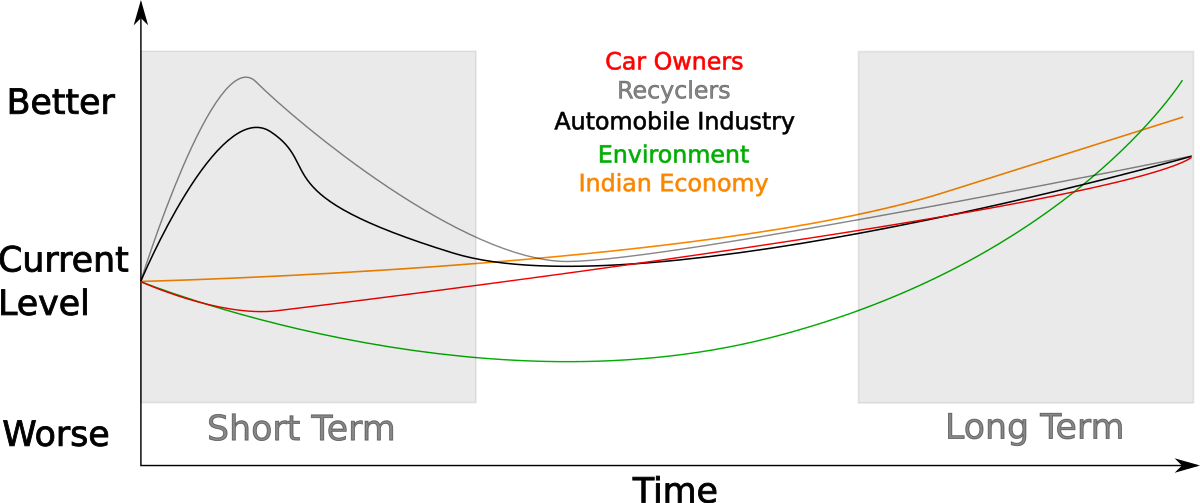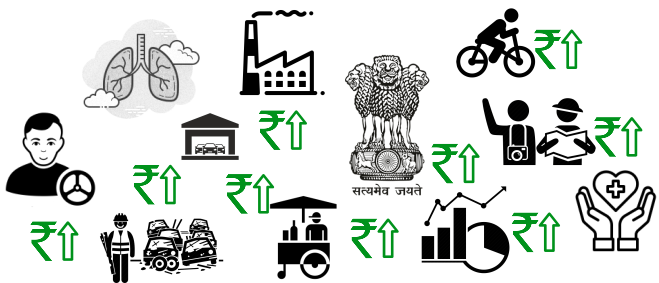Potential impact of the 2021 vehicle scrappage policy.
Introduction:
On 1st February our honorable Finance Minister, Mrs. Nirmala Sitharaman, presented the budget for 2021 and in that budget was a policy that India has never seen before. It is a policy that would send many automobiles to the scrapyard. While Delhi NCR already has a similar policy in place owing to the pollution, this new policy would apply to the entire nation.
The Original Document is available available on the government website.
At ScrapMyCar we listened to her speech with bated breath. We have been following the construction of this policy for many years and were relieved to see it finally announced. However, many of our fellow countrymen were confused; they’re not sure if this policy is good or bad. That is understandable given that India has never seen this before. So here’s what we believe would be the potential impact of the policy and what it means for all of us. We study the short and long term impact the scrappage policy could have on Car owners, Recyclers (scrapers), automobile companies, the environment and then finally, the Indian economy.
The new 2021 scrappage policy is the center of many discussions in India today. In this article, we present our analysis of the possible impacts of this new policy on various sectors - both short and long term.
First of all, it is important to note that this new policy is the Indian incarnation of a global trend which was officially set in motion by the Paris Agreements. Recycling is the most efficient tool at our disposal to fight humanity's most pressing issues: climate change, pollution and a decline in available resources.
1. Short Term impact of the 2021 scrapping policy
1.1. Car owners:
The initial brunt of the policy will be felt most by car owners, as they are the ones who will be paying most for the implementation of the policy. So naturally, they are the most concerned about this policy.
If you own a car that’s nearing 20 years, you have a tough decision to make soon: Do you scrap your car or get it extended for a few more years? If you scrap it then you need another car to replace it, if you plan to buy a used car, you have to think twice as used cars now have a shorter life; if you are buying a new car, which car do you choose now that their life is limited? These are new issues the Indian car owner has to face. Never before has this happened in India. Car owners lose a few more years of ownership. They also need to sell cars that may hold emotional value. As Also important to note that majority of cars scrapped will be commercial vehicles. The usable life of commercial vehicles will now be 8 years only. We believe this is not too bad for commercial vehicle owners because as per our studies, most commercial vehicles have an ROI of about 3-5 years. So while it will surely influence their balance sheet, only time will tell how bad it is for their bottom line. Car owners have taken to online forums and groups to discuss this policy.
While this policy seems like an attack on car owners, it really is not: Majority of private car owners in India do not drive a car that is nearing 20 years of age. People change cars quite often nowadays unlike the previous generation. Think about it, how many people do you know who drive a 20 year old car? Probably more in smaller towns and cities but even that is getting rare. The majority of car owners today, unlike previous generations, upgrade sooner to newer models. In cities at least, cars are a utility and not aspirational anymore so upgrading cars is quite common. Most older cars are sitting on roadsides, workshops or in parking lots collecting dust because the owners prefer driving their newer cars. This policy will push these owners to get rid of those cars. For the few who want to keep them, they only have to prove (via fitness test) that their car is not polluting and is healthy to run on roads. Also, there is a proposed incentive to car owners who scrap their cars. We don’t know exactly what it is as the details have not been announced yet but this incentive scheme will certainly soften the hit for car owners. We’re excited to see the details and will keep you posted!

1.2. Recyclers:
The immediate benefit of this policy will be to the automobile recyclers (scrapers). The amount of cars that need to be scrapped in India is huge and the number of companies that scrap cars is very low. There are only 4 licensed recyclers in Delhi NCR and none outside of Delhi NCR. So the opportunity for recyclers is huge. They will benefit the most from this policy. Indeed, not all scraped cars will be replaced - hence an even bigger impact than on the automobile sector!
However, this is not an easy opportunity. There are legal and environmental procedures that need compliance and most recyclers in India will find it hard to adhere to these requirements. The car scrapping sector in India is highly unorganized and lacks credibility. Most scrappers are seen as unscrupulous individuals who just want to make a quick buck without care for the law or the environment. They will have to get organized and adopt proper procedures and conduct if they want to gain benefit from this policy. Also, this policy would install a strict legal procedure for scrapping cars which most scrappers would find hard to follow ( read our article on what to do with End of Life vehicles to understand the risks). So they need to get educated on legal issues and new technology if they want to survive in this new environment.
1.3. Automobile Sector:
The automobile industry in India is one of the largest employers and contributes significantly to our GDP. In 2020 with the onset of Covid, the industry suffered a lot and had it’s worst year ever. The immediate impact of the new vehicle scrappage policy will reflect in an increase in new car sales. As car owners scrap their old cars, they will replace them with new cars instead of used cars. This is the main reason automobile manufacturers pushed the government to make this policy.
This policy will certainly boost new car sales in the short term and get the industry back on track - especially for commercial vehicle manufacturers (This was evident in the stock market as the Nifty Auto Index went up almost 4.6% led by a 11.4% jump in the share price of truck maker Ashok Leyland soon after the announcement).
Similar Cash for Clunkers schemes in the US, UK, France, Germany and China were established during the crisis of 2008-09 to speed up new vehicle sales and help stimulate the economy. There will also be renewed investment in this sector especially in automobile component manufacturers.
However, automobile companies need to be careful as buyers will be seeking more value now than ever before. There is a good chance that sales of luxury vehicles could go down as buyers may go for cheaper cars.
1.4. Environment:
The environmental impact of the policy will be negligible in the short term. A lot of damage has been done to the environment and while nature has an incredible capacity to regenerate itself, this takes time.
In the short term, this policy does what is required: it tackles emissions by polluting vehicles and ensures that old vehicles are recycled in an environmentally friendly manner thus effectively preventing further pollution of air, soil and water.
Reducing our emissions will only have an impact on air quality in the long term. Central Pollution Control Board (CPCB) has been advocating similar policies for a long time as they are well aware of the damage cased by vehicular pollution. This policy is a welcome break to CPCB even if it does not bring any immediate improvement to the environment.
1.5. Indian Economy:
In the short term, we do not expect this policy to have a huge impact on the GDP. As seen in China, a similar vehicle recycling policy did not significantly contribute to increase in vehicle sales. As expected, a rising economy and increasing wealth were the main drivers of new car sales. However, we do believe that the automobile sector’s contribution to the GDP will increase due to the rise in new car sales. Also, other government projects will be affected since government funds will be diverted towards this policy. And similarly, other sectors of the Indian economy will be affected as car owners now have to spend on the purchase of replacement cars and thus will have to defer other purchases for a later time. But as we will see later, this short term reallocation of spendings will have huge positive long term economic repercussions in India!

2. Long Term impact of the 2021 scrapping policy:
2.1. Car Owners:
In the long-term, this policy will have a stronger psychological and behavioural impact on car owners than financial. In India, cars are perceived as a luxury item and owners hold on to them for many many years. It is one of the biggest investments that people make. But this scrappage policy has now turned cars into objects with expiry dates. This is bound to change the dynamics of car ownership in India. Buyers will now think twice about what car they are buying. Also the cost of replacing the car will be a major factor in their decision to buy a car.
The long term financial impact of this policy on car owners is hard to ascertain at the moment. Yes we realise that raw material costs will be lower but does that necessarily mean cars will be more affordable? Newer model cars come with new features and technology and this will not be cheap regardless of the raw material costs. And will manufacturers really pass on cost savings to car buyers or would they rather invest those savings into research and development, marketing etc.? The incentive scheme embedded in the scrappage policy could lighten the cost a bit but that is only for car owners who have previously scrapped an old car. So it is tough to determine how this policy will play out for car owners. However, there are 2 assured long term benefits of this policy that are almost guaranteed to bring down the Total Cost of Ownership (TCO) of cars::
1. Good quality used car parts will be more available and thus will help reduce overall car maintenance costs. That for sure is bound to happen much to the dismay of auto parts manufacturers.
2. The better fuel efficiency of the new vehicles mean people will spend less on petrol for the same distance driven. Given the recent astronomical rise of fuel prices in India this is certainly a welcome relief.
2.2. Recyclers:
Once regarded as the outcasts of the indian economy, automobile recyclers will become a vibrant, valuable player as they facilitate India’s transition into a circular economy. Recyclers used to operate on the fringes of India's society and were looked down upon in disdain by other business sectors. They were the kabadiwala that no one wanted to associate with but this policy will transform auto recyclers into important, legitimate and vital entities who strengthen the economy by reincarnating waste into valuable raw material for the industry while also improving the environment by employing eco-friendly waste management techniques.
Automobile recycling will become a well organized and regulated industry attracting investments from credible sources, creating jobs and supporting livelihoods in many sectors. The future looks bright for automobile recyclers but they have to adapt new technology and methods or else they will be made redundant. They are no longer the road-side scrapers, they have to be tech savvy and professionally managed if they seek to survive in the long term.
2.3. Automobile Sector:
The automobile industry has been booming in India these last decades. We do not believe that this policy will directly affect new car sales in the long term. Where this policy has the biggest impact for the automobile industry is not so much that cars will be replaced much more often than before, but that they are guaranteed to be recycled when they are replaced! This establishes a local raw materials supply chain, allowing the industry to continue its growth without being constrained by resources.
The direct impact of the policy on local revenue of the industry is expected to increase from the current 4.5 lakh crores to approx. 10 lakh crores in a few years (cfr document linked at beginning of article). While this sector is expected to continue growing, new car sales will mainly be driven by rising wealth and cheaper finance. Infrastructure will also remain an important factor for the industry: the current infrastructure is overcrowded and inadequate, the government needs to build better and more roads. It will not be easy to fit more cars on the streets with the present conditions.
Note that the government's will to "go green" might favor light electric vehicles in the long term (e-scooters, e-bikes, ...). The required infrastructure is cheaper to build and to maintain than the infrastructure required for increasing car traffic.
2.4. Environment:
This policy not only means that our running cars will be greener, but also that our old cars will be dismantled properly - preventing leakages of toxic fluids into the soil. We must praise our government for the ordered and strict implementations of these policies: they did a great job!
Depolluting the atmosphere takes a long time, again, nature will do it for us if we leave it to do it's thing. By drastically reducing our carbon footprint, these policies are a necessity if we want to see our mountain ranges from far away like we used to and wish that our grand-children be able to breathe the same air our grand-parents did!
Impact on the environment is slow, but most significant for wellbeing, as cleaner air will reduce respiratory illnesses, preventing leakage of chemicals will prevent chemical contamination of soil and water and thus intoxications.
2.5. Indian Economy:
The long term impact of this policy is interesting from an economic perspective. While it will not be the main driver of new car sales, it will play a critical role in the lifecycle of automobiles in India and will greatly contribute to achieving a circular economy in India.
Raw material (scrap) from old cars will be sold to metal, rubber, glass and plastics producers who will in turn sell their finished goods, not only to the automobile sector, but to various industries. Since this scrap is created domestically, it will be cheaper thus reducing the cost of new goods in general. Since more cars will be scraped regularly, the domestic supply of scrap material will be robust thus reducing imports and preserving our foreign currency reserves. Speaking of this circular system, Mr. Nitin Gadkari pointed out that this Policy will “lead to new investments of Rs. 10,000 crores and create 50,000 new jobs”. No one can argue that this is not a good thing.
The automobile sector is a critical economic driver so if this sector does well it strengthens the economy as a whole. India could potentially become a global manufacturing hub of automobiles and automobile components and increase exports to at least double the current figure of approx. 1.5 lakh crores.
Also very importantly, the whole scraping sector in India would gain legitimacy, which means that this previously "grey market" will now become organized, accountable - and thus taxable! So the government just created a new source of revenue by this policy thus adding to GDP and government income again!
The long term environmental impacts will also reduce pollution induced illnesses. This is not limited to reducing healthcare costs, but living healthier in general! Very importantly, this strongly supports Prime Minister Shri Narenda Modi's "Aatmanirbhar Bharat" initiative, which seeks to make India as self reliant as possible.
3. Conclusion:
All-in-all, we believe this policy is a very-well thought implementation of good intentions. The initial brunt paid by car owners is negligible compared to the long term benefits brought to our country by this policy.
These long term consequences are much wider than what first meets the eye (automobile sector, car scrapers, environment and the economy). The long term health benefits brought by this policy means we get to live longer and in better conditions! A cleaner and more resilient India is not only a better place to live for every citizen of our country, but is also more likely to attract more foreigners, both as investors and as tourists.
While many people see a direct contradiction between economy and environment, with this policy our government is proving to the world that it does not always have to be the case. #proudtobeIndian

We will write a followup article once the policy has been published, in the meantime, don’t hesitate to share this article if you liked it, to contact us if you have further questions, or even better, if you just decided to scrap your old car, why not get a quote now!